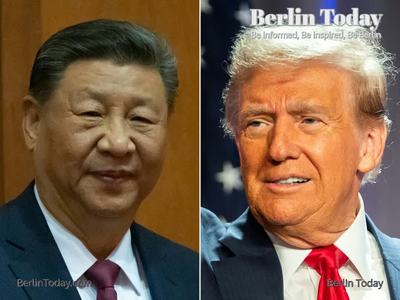
Global Markets Shudder as Trump Tariffs Trigger Economic Fears
Investor anxiety escalates amid sharp market downturns and rising recession concerns linked to new tariffs.
Global financial markets faced severe downturns following the announcement of new tariffs by U.S. President Donald Trump, raising fears of a potential recession.
On Monday, stock indices around the world, including major exchanges like the DAX and FTSE, experienced significant declines.
Trump's tariff measures, primarily targeting Chinese imports, sparked reactions from investors who feared increased volatility.
Significant sell-offs occurred across various stock markets, while U.S. Treasury bond prices rallied, indicating a flight to safety among investors.
Jamie Dimon, CEO of JP Morgan Chase, has expressed concerns regarding the potential for a recession, impacting investor sentiment on Wall Street.
Reports indicate that as a result of the heightened tensions induced by these tariffs, significant fluctuations in asset prices have ensued for various sectors.
In the midst of these developments, a study from an economist criticized Trump for allegedly misinterpreting data related to tariffs.
Economists argue that the weight of tariffs would mainly fall on American consumers rather than foreign companies, contradicting the rationale provided by the administration.
Public opinion within the United States appears split regarding the tariffs; a recent poll indicated that about 73% of respondents expect price increases due to the tariffs over the coming months, while 57% expressed opposition to the tariffs themselves.
Despite this, 39% of those surveyed supported the government's stance, with some citing a belief that U.S. manufacturing was unfairly disadvantaged in international trade.
In parallel developments, Italian Prime Minister Giorgia Meloni outlined her negotiating approach concerning the tariffs after meeting with U.S. officials.
She proposed a 'zero-for-zero' tariff plan, suggesting that mutual tariffs on industrial products could be eliminated.
This proposal received backing from EU officials, highlighting the broader implications of these tariffs for international trade relations.
As the trade impasse deepens, the European Union has urged a resolute stance against the tariffs, with officials asserting that a fair trading environment is essential for global economic stability.
Concerns have also been raised regarding inflation risks and potential hindrances to monetary policy normalization in the Eurozone due to the ongoing trade disruptions.
Markets in Asia have shown some resilience with selective recoveries, signaling investor speculation on potential negotiations.
The Nikkei in Japan observed a notable increase, while Hong Kong's Hang Seng Index displayed modest gains.
However, overall sentiment remains cautious as participants continue to monitor the situation for updates that may indicate shifts in trade policy.
On Monday, stock indices around the world, including major exchanges like the DAX and FTSE, experienced significant declines.
Trump's tariff measures, primarily targeting Chinese imports, sparked reactions from investors who feared increased volatility.
Significant sell-offs occurred across various stock markets, while U.S. Treasury bond prices rallied, indicating a flight to safety among investors.
Jamie Dimon, CEO of JP Morgan Chase, has expressed concerns regarding the potential for a recession, impacting investor sentiment on Wall Street.
Reports indicate that as a result of the heightened tensions induced by these tariffs, significant fluctuations in asset prices have ensued for various sectors.
In the midst of these developments, a study from an economist criticized Trump for allegedly misinterpreting data related to tariffs.
Economists argue that the weight of tariffs would mainly fall on American consumers rather than foreign companies, contradicting the rationale provided by the administration.
Public opinion within the United States appears split regarding the tariffs; a recent poll indicated that about 73% of respondents expect price increases due to the tariffs over the coming months, while 57% expressed opposition to the tariffs themselves.
Despite this, 39% of those surveyed supported the government's stance, with some citing a belief that U.S. manufacturing was unfairly disadvantaged in international trade.
In parallel developments, Italian Prime Minister Giorgia Meloni outlined her negotiating approach concerning the tariffs after meeting with U.S. officials.
She proposed a 'zero-for-zero' tariff plan, suggesting that mutual tariffs on industrial products could be eliminated.
This proposal received backing from EU officials, highlighting the broader implications of these tariffs for international trade relations.
As the trade impasse deepens, the European Union has urged a resolute stance against the tariffs, with officials asserting that a fair trading environment is essential for global economic stability.
Concerns have also been raised regarding inflation risks and potential hindrances to monetary policy normalization in the Eurozone due to the ongoing trade disruptions.
Markets in Asia have shown some resilience with selective recoveries, signaling investor speculation on potential negotiations.
The Nikkei in Japan observed a notable increase, while Hong Kong's Hang Seng Index displayed modest gains.
However, overall sentiment remains cautious as participants continue to monitor the situation for updates that may indicate shifts in trade policy.
Translation:
Translated by AI
AI Disclaimer: An advanced artificial intelligence (AI) system generated the content of this page on its own. This innovative technology conducts extensive research from a variety of reliable sources, performs rigorous fact-checking and verification, cleans up and balances biased or manipulated content, and presents a minimal factual summary that is just enough yet essential for you to function as an informed and educated citizen. Please keep in mind, however, that this system is an evolving technology, and as a result, the article may contain accidental inaccuracies or errors. We urge you to help us improve our site by reporting any inaccuracies you find using the "Contact Us" link at the bottom of this page. Your helpful feedback helps us improve our system and deliver more precise content. When you find an article of interest here, please look for the full and extensive coverage of this topic in traditional news sources, as they are written by professional journalists that we try to support, not replace. We appreciate your understanding and assistance.











